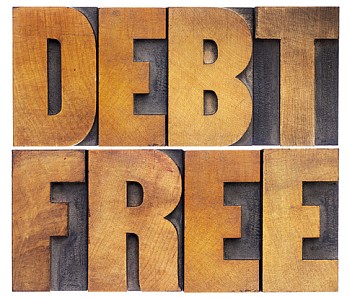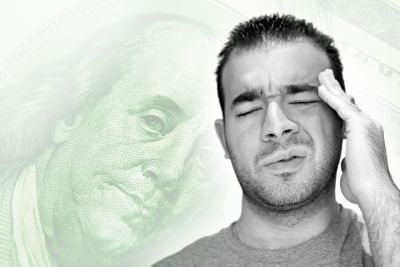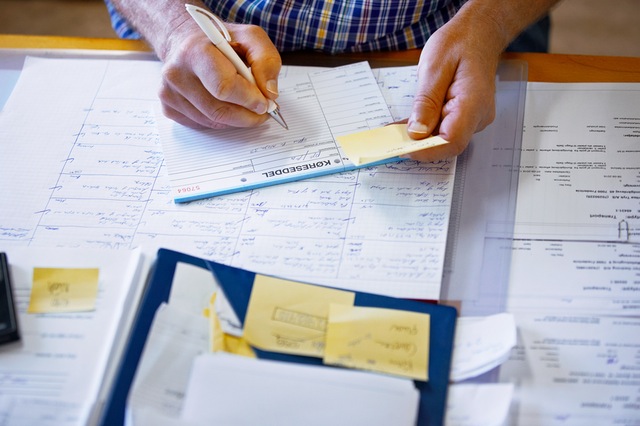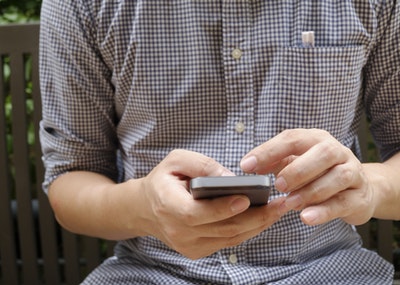How to Live Debt Free For Life – 4 Things To Help You Make The Change
For many, becoming debt free for life seems like an unattainable goal. Yet by learning how to control debt, living debt free is not only possible but a likely outcome. With New Year’s right around the corner, now is the time to start thinking about the resolutions you will make for 2013, and living debt free might be one of the best resolutions you can choose.
For one thing, living debt free might reduce your risk of identity theft. If you know you have no debt and are suddenly contacted about purchases you don’t remember making or accounts that you never opened, you’ll immediately know that there is a problem and be able to quickly put a stop to it. Learn how technology leads to the types of identity theft that most deeply threaten your financial health here.
Start Small: Stop Using Credit Cards
Putting a stop to credit card use is the first step in learning how to live a debt free lifestyle. Credit cards are one of the easiest ways to accumulate debt, and unfortunately one of the most expensive, with interest rates far exceeding those of secured or even personal loans. Credit card use has also become so normalized, it’s easy to lose track of how much that debt is really costing you.
You can start small on your way to becoming debt free for life by resolving not to use credit cards for a certain period of time – three months, for example. By learning how to live within your means without dipping into credit card debt during that time, you will realize that it is possible to live without accumulating more debt.
Build Your Finances: Pay Yourself First
You might have heard the old adage “pay yourself first” and taken it to mean a reward before paying your debt. In a sense paying yourself first is a reward, but not an immediate one like going out to the movies. Paying yourself first is a long term reward to strengthen your finances by saving money for what really matters, your financial health. Before paying your debt and other obligations, set aside an affordable but meaningful amount to put towards:
- Retirement accounts, like an IRA or 401(k)
- Personal investment accounts, like brokerages and mutual funds
- Rainy day savings accounts that net interest
Generating a second income through a part-time endeavor is another way to live debt free that makes it easier to pay yourself first, since the additional income can replace the need to take on additional debt. Read about making extra money with webinars in Stumble Forward’s article, “Making Money With Webinars – Why You Can’t Afford To Skip Out On This Revenue Stream!”
Control Spending: Pay with Cash Only
Research has shown that people actually feel emotional pain when exchanging cash for goods and services, while paying with credit cards does not have the same impact. This means that people are willing to pay more for the same benefit when paying with credit, and are also likely to spend more overall. According to a recent study by Promothesh Chatterjee and Randall Rose, this might be because credit card users focus more on luxury, while those paying in cash are more attuned to the overall cost.
Another study found that people paying with credit cards might also be influenced by the type of device they are using, since iPad users spend roughly twice as much online as users of other mobile devices or desktop computers. Chief Strategy Officer of IBM Coremetrics John Squire attributes this in part to the fact that retailers are focusing on creating “a relevant, hyper-personalized page” for mobile users to make purchases.
In addition to staying on the right side of psychological decision making, it might also be easier for consumers who pay with cash to keep track of their overall spending, since they can see the money in their wallet gradually diminishing. Try making a cash budget for all of your non-debt expenses as a step towards living debt free.
Know What You Have: Live On a Budget
Of course, even the best intentions for ceasing credit card use and paying in cash can backfire if you don’t create a budget. Creating a budget is both a short-term and a long-term outlook on your finances, so that you know what you really have to spend once you pay off your utilities, housing, debt, and other expenses. Consider:
- A budget is the only way to balance your incoming funds against your outgoing expenses.
- A budget keeps you from dipping into savings or relying on credit cards while encouraging you to save money by trimming costs.
- A budget gives you the encouragement you need to stay on track and measure your financial performance month by month.
There is no easier way to stay on track with a debt free lifestyle than creating a budget. Even if you have considerable debt to pay off, a budget will help keep you from accumulating more debt while you work on repayment. Since you are not acquiring more debt in the meantime, any existing debt you have will be paid off more quickly, resulting in a debt free life more quickly than you might expect. Don’t make the mistake of overlooking this critical step on your path to living a debt free life.






These are all great tips! Definitely pay yourself first and live by a budget.
That’s probably one of my strongest points is paying myself first, because I will typically save whatever I earn over a specific dollar amount out of every paycheck. As for the budget I still need to tighten up in a few areas their yet but for the most part I’m doing pretty good. Thanks for the comment Michelle.
These are all great tips, especially paying yourself first and live with a budget. We went to a largely cash budget several years ago and I can attest to that physical pain of paying with cash. I hate parting with it, which has made both my wife and I much more discerning shoppers to make sure we really either need the item or will get use out of it.
excellent post, I live debt free and I am very happy. Funny thing is that I lost my job last month and I still relaxed and not in panic 😉 debt free- highly recommended! 🙂
That’s awesome Siegfried. I wish I were able to do that right now. I think the other great thing about having extra money saved up and no debt is that it gives you piece of mind that you won’t get into a pinch if things blow up such as loosing your job. Thanks for stopping by.
I like the idea of going back to cash but have several things I do pay with a credit card such as gas. My wife and I have one card specifically for just buying gas which gives us 5 Cents to 25 cents off per gallon. However if my debt problem were to get out of control I would have not choice but to freeze my credit cards to avoid doing anymore damage. Thanks for the comment.
Very true tips. I love my rewards points to go all cash, but I can see the need for that if you have credit card balances. Luckily, I never plan to carry one again.
We’ve been doing well for a while, and we STILL only use cash for our spending and grocery money. It just makes things so much easier to keep track of – I just need to look in my wallet.
thanks Chris. the biggest problem now for young people is the house or flat – this is gonna put you into the debt for years. One solution is to earn money in country like UK or US and live in cheaper country – like Thailand. from what i know it works pretty well for many IT people
regards!
Great Post
I like your tip about paying with cash. I also find that I am far more likely to think about a purchase if I am paying with cash than if I pay with credit (or buy online for that matter)
I agree the cash method is the best way to go if things are tight an you really want to uphold the budget bceause things like credit cards can add a pretty good leak to you budget if you’re not careful. Thanks for the comment.
I know a lot of people are doing that to offset cost and live on the cheap but I know I’ll never do it but it’s a great thought.
I agree Kim I could never give up my credit card rewards either. I have a gas card that saves me between 5 cents to 25 cents per gallon and I would be crazy to give that card up. However it’s also one of the few times I do use a credit card as well but is very well worth if when you pay them off each month like you said.
I agree Glen it seems like your mindset totally changes when you pay with cash versus credit. I do this a lot of times. For example I went to the grocery store the other day to buy some steaks and had $7 with me. I could have just as easily pulled out my card and bought the biggest stake they had but since I’m a saver at heart I opted to find a few steaks more in my price range. Thanks for stopping by.
When my wife and I stopped using credit cards, we immediately started spending less. I don’t know all the psychology behind why that happened…it just did. It really was like giving ourselves a raise in the monthly budget.
When I was in a financial bind years ago one of the first things I learned to do better was budget. It really helped to keep track of how much money I had and make sure I didn’t spend more than I had. I also got rid of my credit cards which really helped me control my spending.
I’m thinking of doing the same thing Brian. I have two credit cards that have a few thousand dollars each on them and I think the only easy way to pay them off is to stop using them altogether in order to get back on top of things. I also agree with no credit cards the temptation to spend will not be there as quickly. I know if I just focused on it for short period of time we could get them paid off fast.
I can totally agree with you their Miss T. That’s one thing I’m thinking of doing is cutting out the credit cards and getting more serious about our budget. I think as long as we have our credit cards we will never get them paid off. On top of that we have regular expenses that we pay with these cards such as our gas card and that may take an adjustment to get use to but it will defiantly worth it once I’m not paying on them every month.